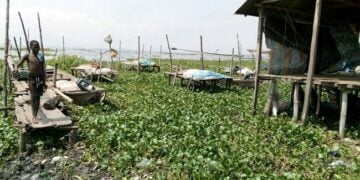The federal government has reaffirmed its commitment to transforming Nigeria’s agricultural landscape into a thriving agribusiness sector, positioning the country as a major player in regional and global food markets.
Speaking at the Presidential Roundtable on Agribusiness in Abuja, the Honourable Minister of Agriculture and Food Security, Abubakar Kyari, emphasised the administration’s vision of agriculture as a key driver of economic diversification and value creation.
He noted that under President Bola Ahmed Tinubu’s leadership, agriculture has been elevated beyond subsistence farming to an ecosystem of economic value, aimed at empowering farmers and fostering private sector-led growth.
“The declaration of a state of emergency on agriculture by Mr President was not a mere symbolic gesture but a call to action. Food security is national security, and a structured, efficient agribusiness sector is crucial for economic stability and social prosperity,” Kyari said.
The minister highlighted Nigeria’s vast agricultural potential, including its extensive arable land, favorable agro-climatic conditions, and a youthful, entrepreneurial population.
He stressed that the government is actively working to eliminate investment barriers and create a conducive environment for both local and foreign investors in agribusiness.
“With access to over 200 million consumers within Nigeria and a regional market of more than 1.4 billion people under the African Continental Free Trade Area (AfCFTA), Nigeria is one of the most attractive agribusiness destinations,” he stated.
Kyari further outlined strategic partnerships with international development institutions such as the African Development Bank, World Bank, Japanese International Cooperative Agency (JICA), Islamic Development Bank.
These collaborations aim to finance large-scale agricultural initiatives and enhance food system resilience amid global economic shocks and climate change.
President of the Nigeria Agribusiness Group (NABG), Arch Kabir Ibrahim, echoed similar sentiments, reaffirming the private sector’s commitment to supporting the administration’s efforts in ensuring food security.
He commended the government’s focus on mechanization, year-round farming, and access to credit for farmers through the capitalisation of the Bank of Agriculture.
“Our efforts in deploying mechanisation and strengthening extension systems are already yielding visible results. There is a clear focus on attracting youth into agriculture, boosting production, and creating wealth while ensuring food security,” Ibrahim stated.
The event also featured a keynote address from the vice president’s senior special assistant on Agribusiness, Kingsley Uzoma, who emphasised the role of public-private partnerships in achieving sustainable agricultural growth.
The director general of NABG, Jafar Umar in his welcome address, described the roundtable as the beginning of a transformational dialogue, bridging gaps between policy and private sector realities.
“Through structured engagements like this, we aim to align policies, strengthen agribusiness competitiveness, and position Nigeria as a leading player in regional food markets,” he said.
The roundtable concluded with a renewed commitment from stakeholders, policymakers, and investors to implement actionable strategies that will not only enhance food security but also establish Nigeria as a dominant force in the African agribusiness ecosystem.





